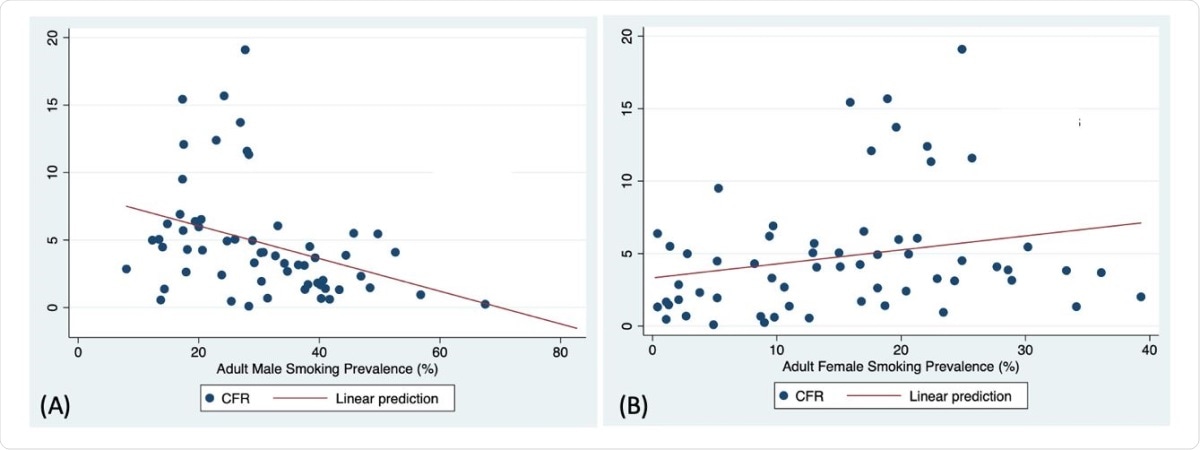Tobacco smoking negatively impacts overall health. Apart from being linked to respiratory diseases, such as lung cancer and chronic obstructive pulmonary disease (COPD), it can contribute to the development of potentially fatal diseases, such as hypertension, heart disease, and stroke.
Over the past year, the coronavirus disease 2019 (COVID-19) pandemic has wreaked havoc globally, infecting over 65.23 million cases. Since COVID-19 is a respiratory illness, caused by the severe acute respiratory syndrome coronavirus 2 (SARS-CoV-2) pathogen, many studies have tackled the effects of tobacco or cigarette smoking on COVID-19 patients.
A team of researchers from the Epidemiology Department, Faculty of Public Health, Universitas Indonesia, Depok, Indonesia, has found no correlations between adult male and female smoking prevalence with COVID-19 mortality across countries. In lower-middle-income countries, however, there is a link between adult male smoking prevalence with COVID-19-related death.
In fact, the team revealed that each percentage point increase in how often adult males smoked caused a case fatality ratio (CFR) of COVID-19 increase by 0.08 percent.

 This news article was a review of a preliminary scientific report that had not undergone peer-review at the time of publication. Since its initial publication, the scientific report has now been peer reviewed and accepted for publication in a Scientific Journal. Links to the preliminary and peer-reviewed reports are available in the Sources section at the bottom of this article. View Sources
This news article was a review of a preliminary scientific report that had not undergone peer-review at the time of publication. Since its initial publication, the scientific report has now been peer reviewed and accepted for publication in a Scientific Journal. Links to the preliminary and peer-reviewed reports are available in the Sources section at the bottom of this article. View Sources
Smoking and COVID-19
It remains unclear when the COVID-19 pandemic will end. Studies reveal that it may take at least a decade to restore the social and economic conditions to normalcy.
Amid the pandemic, more people stay at home to prevent infection with SARS-CoV-2. Many studies tackled the effect of staying at home to individuals, and some found that the time spent indoors is lengthened, increasing the risk of harmful tobacco smoking.
Smoking is the leading risk factor for disease and death related to various non-communicable diseases, including heart disease, hypertension, lung cancer, and stroke. It is well-known that people with underlying medical conditions are at a higher risk of developing severe COVID-19.
Previous studies showed that smoking increased the risk of severe symptoms and mortality by two-fold compared to those who did not smoke. On the contrary, some studies suggest a protective effect of smoking and COVID-19 based on data not controlled for age and comorbidities or underlying health conditions.

(A) Correlation of adult male smoking prevalence with COVID-19 case fatality ratio in upper and high-income countries group (Spearman correlation r=-0.4472, p=0.000). (B). Correlation of adult female smoking prevalence with COVID-19 case fatality ratio in upper and high-income countries group (Spearman correlation r=0.2706, p=0.037).
Study findings
In the current study published on the pre-print medRxiv* server, the researchers aimed to analyze the potential correlation between adult tobacco smoking prevalence and COVID-19 mortality worldwide.
The study is the most comprehensive one to analyze the correlation of adult female and male smoking prevalence with the lethality of COVID-19. The team used pooled data from about 75 countries.
To arrive at their findings, the researchers conducted a correlation study. They included countries that had 1,000 total confirmed cases by May 3, 2020. Further, mortality data per country was obtained from the COVID-19 situation report published by the World Health Organization (WHO).
The study findings showed no correlations between adult male or female smoking prevalence with death related to COVID-19. However, they also found that adult smokers in lower-middle-income countries were at a higher risk of COVID-19 mortality.
In 2015, it was estimated that 80 percent of smokers across the globe live in low-and middle-income countries.
Also, the team noted that the study has limitations. For instance, the data they obtained was from the WHO, where the number of deaths and cases might not reflect the exact situation worldwide.
“Based on these findings, strengthening tobacco control policies and assisting smokers to successfully and permanently quit are needed to reduce the impact of the COVID-19 pandemic, especially in low-middle-income countries,” the team recommended.
Global situation
To date, more than 65.23 million people have been infected with SARS-CoV-2. Among these, over 1.51 million people have died due to the infection.
The United States remains the country with the highest number of cases, reaching 14.14 million. Many countries report surging COVID-19 cases, including India, with more than 9.57 million cases, Brazil, with over 6.48 million cases, and Russia, with more than 2.35 million cases.
France and the United Kingdom experienced skyrocketing cases over the past month. Now, the UK has over 1.67 million cases, and France reports a staggering 2.31 million cases.

 This news article was a review of a preliminary scientific report that had not undergone peer-review at the time of publication. Since its initial publication, the scientific report has now been peer reviewed and accepted for publication in a Scientific Journal. Links to the preliminary and peer-reviewed reports are available in the Sources section at the bottom of this article. View Sources
This news article was a review of a preliminary scientific report that had not undergone peer-review at the time of publication. Since its initial publication, the scientific report has now been peer reviewed and accepted for publication in a Scientific Journal. Links to the preliminary and peer-reviewed reports are available in the Sources section at the bottom of this article. View Sources
Source:
Journal references: